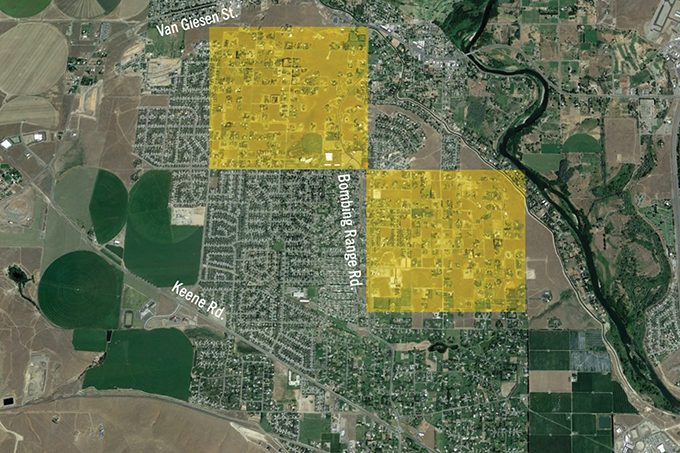
Home » Land use questions draw concern in West Richland
Land use questions draw concern in West Richland

December 16, 2019
Some West Richland, Benton County residents worry about
fate of their land due to an obscure 81-year-old law
Whose land is it
anyway? When it comes to portions of lots in West Richland, it depends on who
you ask.
“Legally, under my
impression, this land has been mine, because Benton County has done all their
due diligence recording their records,” said Pat Carranza, a West Richland
landowner.
Carranza and her
neighbors own property that was originally platted as part of federal land
patents issued by the United States during homesteading in the 1930s as a way
to develop a community around the Hanford nuclear reservation.
“There aren’t too many
areas formed like this. It’s a somewhat unusual critter,” said Kenneth W.
Harper, a Yakima attorney who specializes in land use and zoning, who spoke at
a recent city council hearing on behalf of the city of West Richland.
Harper first got
involved in 2017 when a landowner raised concern after trying to get a building
permit for an area within his legal property description.
“The city’s position
had been, ‘We’d be happy to let you use this land. We just don’t have a process
that confirms whether we continue to claim an interest in that land or we
don’t,’ ” Harper said.
As West Richland tries
to clarify the issue, it has neighbors concerned the city will try to act on
easements written into land disbursements granted back in 1938 as part of the
Small Tract Act.
The legal
interpretation of the federal land patent ownership is now in question, as the
federal government has said it has no interest or decision-making rights on the
future of lots created by land patents. To muddy the waters, it didn’t offer
direction on who could.
Carranza’s 2.3-acre
parcel is close in size to hundreds of other similarly-affected properties near
the Bombing Range Sports Complex and Flat Top Park.
The historical deed for
Carranza’s property dates back to 1956, based on data from the county assessor,
when the borders were solidified by Benton County.
Prior to that, the
federal government had platted the land into lots and access roads, with each
plat reserving 33 feet along one or more of the boundaries for potential
development or use as a right of way.
These became known as
federal patent reservations, or general land office easements, and allowed the
U.S. to retain the right to use the land for any public or private purpose if
needed in the future.
The agency responsible
for dividing the land was the General Land Office, which eventually became part
of the federal Bureau of Land Management. This federal office suggested in 1981
that in areas where no land action had been taken by the city of West Richland,
any future development would fall under state law or city code, not federal
rule.
Harper called it a
“funny intersection of Washington land use versus these fairly archaic deed
reservations, or patent reservations, going back to the ’50s.”
“My deed says it’s
mine, but now the city said it’s going to be up to the homeowner to go file and
change the description,” Carranza said. “One, that’s a lot of money for the
city, and two, the homeowners are not aware of it because they assumed that if
it hasn’t been used since 1981, the city doesn’t have a claim to it.”
Carranza said it’s her
land in particular that’s preventing West Richland from connecting a portion of
South 48th Avenue to Collins Road.
The areas in question
are within city limits and shaped like a square, with borders near Bombing
Range on the east, Belmont Boulevard on the west, Paradise Way on the south and
just north of Flat Top Park to the north.
There are two other
sections affected by potential action: an L-shaped area bordered by Bombing
Range, Northlake Drive, South 38th Avenue, Artemis Ridge Road, Paradise Way and
Northlake Drive, and a smaller, rectangular area that includes 14 lots near
South 38th and Paradise Way. About half this area is within city limits and the
remainder in Benton County.
The city may have once
been interested in developing the affected land, according to a draft
comprehensive plan discussed by the planning commission in 2016. While
questioning whether the federal patents will ever be lifted, the draft document
said, “these patent reservations, and the land divisions from the past,
restrain development capacity in these specific areas.”
The current issue is
now to “explore this more thoroughly, get an understanding from what the record
of what the BLM shows as far as its prior positions, and really apply some
legal reasoning to what the Small Tract Act says, what significance should be
placed on the termination of the classification, and then create a public
process that would allow the community to understand what the city was trying
to do, how it would or would not affect individual parcels, and give the city
council a choice that would, in the staff’s opinion, streamline the city’s
interests in these reservations,” Harper said.
The BLM isn’t expected
to weigh in with an official opinion, and Harper doesn’t expect the process to
change anything as far as what rights of way the city has or has mapped, but
rather to clarify so the issue wouldn’t need to be revisited each time someone
applied for a building permit.
As part of this
process, the West Richland City Council held a public hearing before a packed
house on the issue in November. No city action was taken.
The hearing offered a
chance for residents to weigh in on a potential ordinance to accept or decline
portions of land through an official action called an “offer of dedication.” By
accepting an offer of dedication, portions of land used by homeowners could
become city land instead.
Harper said, “We think
it’s fairly clear that as offers of dedication, the city can come along and
say, ‘We need these as part of our road system. We need these because there’s
public infrastructure. Or we need these because it’s pursuant to an agreement.
Or we don’t need because of this, this, this and this.’ That was what the staff
undertook, saying, ‘What can we get ourselves out of so the public can make use
of it?’”
Any chance of land
being used as an offer of dedication has residents concerned.
“We have paid taxes all
these years on that land,” Carranza said.
Additionally, a number
of landowners complained at the hearing that much of the land up for discussion
is not usable due to being sandy “just like a beach,” too steep for a roadway,
or at a dead-end road that “leads to nowhere.”
A property owner who
spoke at the hearing encouraged the city to look at each lot individually rather
than make a blanket determination on its ability to use the affected land.
Carranza agreed,
adding, “The city needs to look at each lot and determine if there was a right
of way, per the termination notice and/or utility prior to 1981. If it wasn’t used
for that purpose, go to the property owner and say, ‘Hey are you interested in
vacating these lands and not having to pay taxes on them?’ You’ll make money,
in kind of a win-win situation, because if they’re not using it anyway, they
might say, ‘Take it.’ ”
The city intends to
review residents’ public comments from the meeting and those submitted to its
public works director.
“We’d like them to be
as active participants as possible because it does affect individuals’ land.
That’s always going to be a topic and potentially very sensitive, and the more
we can communicate with the public about what we’re doing, and allow them to
respond, I think the better the result will be,” Harper said.
The city has no
timeline for making a decision on an ordinance, or whether this will be the
action taken at all.
“The choice may come
down to doing nothing, and we proceed as we have for the past several decades
with this being a somewhat unclear issue,” Harper said. “Or, council could pass
the ordinance and confirm, to the extent the ordinance does so, the lack of
interest of the city in these rights of way that we don’t have any purpose for.
There’s always a third choice that this could become a topic for further study
because it may be that the council’s not quite prepared to take either of those
two options, they want to hear more from staff or have more consideration of
legal opinions, which would be fine.”
Some landowners hired
an attorney and stated at the hearing their counsel would prefer the city allow
the issue to be handled by the judicial system, not through an ordinance voted
on by the council.
There’s an argument to
be made that deciding the issue with some finality could pave the way for
future requests.
“There’s been a regular
concern brought to the city over whether or not these things can be vacated or
whether the city can take a position of the land to make the use of the land
burdened by these rights of way no longer an interest of the city,” Harper
said. “The city has been in a very difficult spot in terms of answering
questions from the public on what these small tract reservations amount to.”
Still, Carranza
believes it is not for the city to decide. “It’s up to the homeowner because
they actually own that land. The city doesn’t own it. The state doesn’t own it.
It’s the patent property owner’s land and you need to respect their rights,”
she said.
Real Estate & Construction Local News
KEYWORDS december 2019





